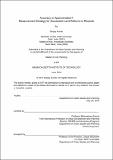Accuracy or approximation? : measurement strategy for successful land reforms in Rwanda
Author(s)
Kumar, Sanjay,M.C.P.Massachusetts Institute of Technology.
Download1140507857-MIT.pdf (8.018Mb)
Alternative title
Measurement strategy for successful land reforms in Rwanda
Other Contributors
Massachusetts Institute of Technology. Department of Urban Studies and Planning.
Advisor
Bishwapriya Sanyal.
Terms of use
Metadata
Show full item recordAbstract
The recent land tenure reforms in Rwanda have the potential to permanently influence the debate around land titling and clear property rights. In 2005, when Rwanda decided to abandon traditional property rights and to embrace formal rights, least did it know it would transform itself by moving from no land records to one of the most advanced and formalized land records in less than two decades. Rwanda climbed to 2nd rank in 2018 in World Bank's ranking of 'Ease of Registering Property' from 137th rank in 2008. Rwanda created its cadastre at a reasonably low cost and in a relatively shorter time period as it adopted the 'general boundaries' or visible boundaries such as road, fence, or hedge over more accurate 'fixed boundaries'. International agencies recommended Rwanda's approach in the form of implementation guidelines to other developing countries within a theoretical framework FitforPurpose (FFP) land Administration. According to the recommended guidelines, the developing countries should adopt FFP as their initial goal, and thereafter, they may aim for an 'ultimate solution' one that developed countries have adopted. This view presents FFP as a cheaper and low-tech solution but also sub-par as compared to the standards adopted by developed countries. This thesis questions the correctness of perception of FFP being sub-par. However, Rwanda still faces informal transactions despite the high rank in 'ease of registering property' and the 6th lowest transaction fee in the world. This study explores the question " Is it ever possible (or efficient enough) to completely formalise all property transactions?" The thesis presents voluntary titling as a middle ground between the binary debate 'in favour of' or 'against' land titling. It also attempts to analyse the land tenure reforms in Rwanda to deduce the important learnings for implementation of titling projects elsewhere.
Description
This electronic version was submitted by the student author. The certified thesis is available in the Institute Archives and Special Collections. Thesis: M.C.P., Massachusetts Institute of Technology, Department of Urban Studies and Planning, 2019 Cataloged from student-submitted PDF version of thesis. Includes bibliographical references (pages 64-69).
Date issued
2019Department
Massachusetts Institute of Technology. Department of Urban Studies and PlanningPublisher
Massachusetts Institute of Technology
Keywords
Urban Studies and Planning.